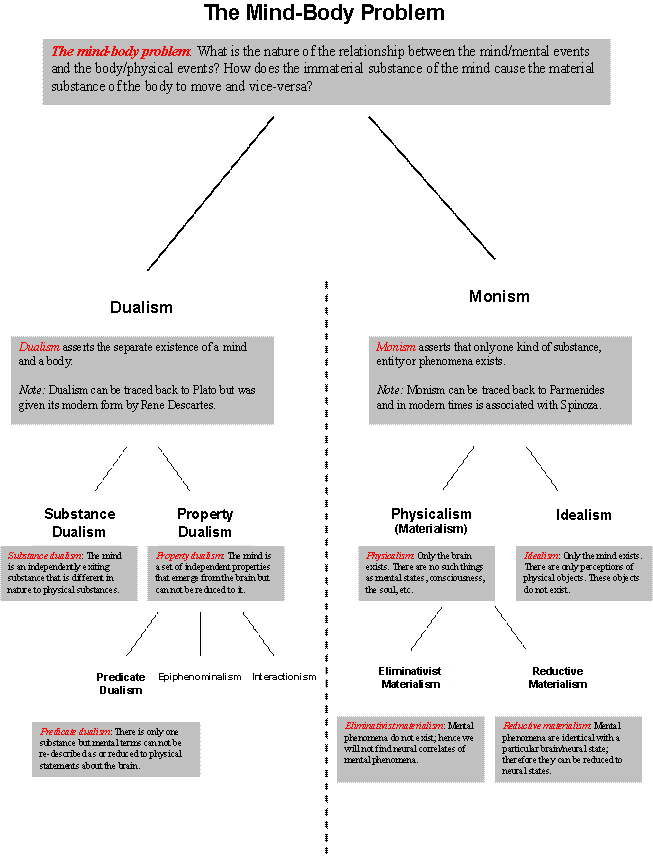

Notes on The mind-body problem
The mind body problem is a classic problem in psychology that relates to all 3 areas of philosophy. In fact, one can view the history of psychology as one long attempt to solve (or try to ignore in the case of behaviorism) this problem. Let’s take a look at it.
Your text discusses this problem beginning on page 31. Generally, the issue is attributed to Rene Descartes, but the basic question of the relationship between mental and physical phenomena goes back probably as far as Plato.
The modern form of the mind-body problem as defined be Descartes is:
What is the difference between mental and physical phenomena?
As we saw earlier, most psychologists today would probably agree that this problem is not solved. We do have a view in psychology today but I think that most psychologists would say that it is merely an interim position until we really understand the nature of mental phenomena.
Part of the problem here is that it seems to be important to understand what mental phenomena actually are before we can discover how they are different from physical phenomena. In the videos you watched 2 weeks ago (Churchland and Chalmers), I think it was clear that there exists today some disagreement about what mental phenomena actually are.
Some people hold the view that mental phenomena are simply brain states/events (Churchland) and others think that mental phenomena are somehow fundamentally different to brain states (Chalmers).
Here is another video of an extremely well known American philosopher John Searle on the nature of the mind.
Watch John Searle giving a TEDx talk on the nature of consciousness.
Now, Searle presents just one view on the problem. There are very many.
Take a look at the figure below and review the positions before we discuss them in class.

Let's go through each position now and see how it is relevant to the history of psychology.
Dualism
There are two kinds of phenomena - mental and physical. The mind is something special, something other than the brain, for example. Dualism is important to psychology. If dualism is correct, then there is something to study other than the brain. If only the brain exists, then it might seem difficult to make the case that psychology has a distinct subject matter from biology, medicine or pathology. This matters! If only the brain exists, then in order to understand human behavior fully, the expertise one would require is physiological or biological. As a student, this would mean that you would start your degree in psychology with calculus, physics, chemistry and biology - you would need to be trained as a PHYSICAL scientist because all the exists would be the physical brain.
Property Dualism
This is a kind of dualism in which the mind is not viewed as a substance or entity but a set of properties that emerge from the brain. The best way to understand this position is via examples. Let's imagine we are interested in the nature of cars and the capabilities of cars. We might look at a car as a set of physical substances, metal, plastic, the engine, etc., and a set of emergent properties such as speed or acceleration. In this view, the brain is analogous to the engine of a car and memories, for example, are analogous to speed or acceleration.
Predicate Dualism
This is a form of property dualism that simply argues that statements like "memories are stored in the brain" are incorrect. In this view it makes no sense to say that thinking, memories, etc, are brain events or processes. In this view, the brain contains neurons, blood vessels, bone, etc., not memories, thinking or any other mental phenomena such as intelligence or depression. The implications here are very important to you. In your education and probably in your life you will come across people that will tell you that depression IS a brain disorder or that your child has ADHD and ADHD IS a brain abnormality. If predicate dualism is correct, statements like this are wrong.
Monism
This view can be separated in to two views - physicalism and mentalism/idealism. Physicalists believe that the only kinds of things that exist are physical things. In physicalism, there is no such thing as the mind and there are no such things as mental events. This view is anti-psychology to be sure. If this view is correct, psychology has no subject matter other than human behavior. There are no real mental entities like thoughts and feelings to study. All there is to study is the brain and behavior. We saw a challenge to this view in the first class. Is acceleration an object? Is it a physical entity? What about Thursday? How heavy is Thursday? What is it's shape, size weight, etc? There do seem to be things that are not physical objects that do enter in to scientific invedtigation.
Idealism
Idealism is a rather bizarre view in which it is held that there are no physical entities. Idealism is related to phenominalism. That is that all we know to exist are perceptions/sensations of things, not the things themselves.
Eliminativist Materialism
In this view, it is pointless for the psychologist to attempt to identify the relationship between brain events/states and mental states because there is no such thing as a mental state. It is pointless, for example, to try to understand the relationship between serotonin level and depression because depression does not exist.
Reductive Materialism
In this position, mental states are brain states. When we say we are depressed, for example, what we really mean is that our serotonin re uptake mechanisms are malfunctioning. Those that hold this view might argue that the old phrase "demon possession" (meaning possessed by the devil) was actually a term that referred to schizophrenia and that someday we will learn that the term schizophrenia actually refers to a specific brain state.